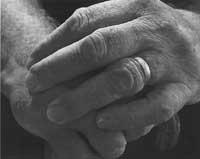MENOPAUSE: Of chains
The causes of lack of information about menopause are multiple and varied. Members of the Gynecology Office have long realized the shortcomings of this issue. In fact, in the last ten years they have been pioneers in dealing with this issue, with talks, roundtables and radio programs, but they clearly saw that other avenues had to be opened to make known the true dimension of the situation.

Continuing the trajectory of these years, the Office developed a questionnaire that was opened in the four centers in Gipuzkoa and distributed in the last three months of 1995 in Donostia, Irun, Eibar and Arrasate. The percentage of responses received was very high, around 95%, with a total of 1,016 women and 81 men. A popular and accessible language was used to ask questions.
Although the main objective of the survey was to highlight the lack of knowledge about menopause, it was also considered as a priority objective to list the factors that can influence this situation, among which factors such as age, the nature of the information received about this situation, the general opinion on menopause and the information received about maternal menopause were taken into account. According to the members of the office, all these factors could directly influence the perception of menopause and, as the survey has shown later, this is the case in the vast majority of cases.
During menopause, does the woman suffer from warming? Is the voice aggravated? Is it normal to reduce sexual appetite? Do women get fat? Does hormone treatment cause cancer and beard or mustache? As you can see, these questions are direct and indirect to the reader. And they were the ones who found all those who came to answer the questionnaire.
“One of the most dramatic moments of my life”

For many women, that is menopause, losing definitely the treasure of youth. Although members of the Gynecology Office expected to receive such responses, they recognized that the situation reflected in the survey has been more worrying than expected.
First, we highlight our lack of information about menopause. It is true that more and more of this topic is being discussed, but this is not enough for the moment. In fact, information about menopause is usually restricted to topics ranging from word to mouth. Therefore, we have few data and those we have are not correct. If the first conclusion is that this situation generates panic.
On the other hand, young women's perception of menopause is much more pessimistic than those who have gone through menopause. At that time, most women recognized that it was “not for so long,” but among young people this reality is not reflected. This is one of the main effects of lack of information. Although it was emphasized among young women that menopause will mean a total loss of sexual appetite and youth, among adults this concern is not given at the same level.
If reality is fiction, menopause joins each other. However, these data vary significantly depending on the quality and quantity of the information. In the case of women, they complained about the lack of information and asked above all to analyze the ways and ways of solution. Only women? Yes, according to the survey, although men recognize that they have little information, with the few who reach them. They think they are enough with what they heard or read between friends or friends or standing. That is the only difference.
Does not know/does not answer

This is the most repeated type of response, a clear example of ignorance. The results of the survey affect the lack of information and what we are told is not correct. Of course, the members of the Gynecological Office have reached the following conclusions. On the one hand, the influence on the mood of information received (or not) on menopause is very high; the woman who has obtained reliable data on menopause does not panic at a situation that will come by chance, but for those who do not have information menopause is “the punishment of the gods”.
On the other hand, depending on age, it can be said that this is an issue that generates a great concern among youth, recognizing that lack of information causes an increase in fear and that, in general, they see in a terrible way the age of old age. Educational deficiencies are very important in this issue. It is clear that in recent years there has been a lot of progress in sex education, tobacco has been broken a lot and people talk naturally about issues that until recently were “forbidden”. However, this naturalness has not met in the same way all biological periods: the changes of youth, pregnancy and childbirth are already common topics among young people, but menopause is strange to them, is it?.
And now what?

The information obtained by the Gynecology Office can be of utmost importance if deposited in the enabled hands. And this data shows that we have a lot of way ahead and that we have to work at many levels. First, this information shows that educational effort is very important. It is observed that the “ghosts” sown in school age condition us for life.
This is therefore the first of the tasks. In addition, these responses indicate that the mechanisms of organization of the special treatment of menopause must be violated. There are gynecological units in our environment, but not public menopause units. This demand will be increasing in a few years, as the average age of the population progresses, the need will increase. This is therefore the second of the tasks. The Gynecological Office wants to make this data available to public health institutions, which are the ones that have to analyze the solutions.
Gynecological Office, 20 years of travel

About 20 years ago the current Gynecological Office was created. Although its origin dates back to the healthcare center of Arrasate, it currently has headquarters in Arrasate, Eibar, Irun and Donostia. From the birth of the organization to the present day, gynecology itself has substantially changed our customs and the taboo environment that until recently had predominated in some subjects.
The Gynecology Office itself has also changed a lot, but during all these years the aim of the organization is to offer comprehensive services to women. And with this objective, a selective collection of data has been initiated in the Office. Through questions, talks or advice on different topics, the intention of the entity is to better know the women of Gipuzkoa, since as is known, it is the first step to anticipate certain problems. And in this context, the topic discussed in this article is precisely the study on menopause. In fact, the menopause unit of the Gynecology Office has been studying these problems for about ten years and the years will take new steps with the experience of the victims.
The services of the Gynecological Office are integrated by the following departments: Pathology Ugantz (Dr. Murgiondo), diagnostic imaging (Doc. Estonba, assisted reproduction (Dr. Gómez), gynecology of adolescence (Doc. Azkue), gynecological oncology (Doc. Ruiz), menopause (Dr. Cristobal), gynecological endoscopy (Doc. Otalora), cytology (Doc. Tombelle) and dietary and food (Dr. Zubizarreta).
Find out!
In recent years women are becoming increasingly important in our society; we could say they are occupying "their rightful place" or "the place they deserve." The resources of culture have made women their own and thus, although until recently it was unthinkable, in political, artistic or literary activities the presence of women is increasing. Or what is the same has been consolidated in society.

However, there is a cultural field that women will have to access in order not to be subjected to totally uncontrollable phenomena: even when it comes to the knowledge of biological laws, women must claim their place. The female body and its biological processes are much richer and more complex than men. The total freedom of the woman implies the acquisition of the knowledge of her body; if she did not, that is, if the woman did not master biological processes that require special attention, she will run the risk of losing everything she earned until then.
And menopause is one of those biological processes. Knowing the menopause, the woman will have the opportunity to know the consequences of the same and in this way can get the property. Young women may receive information about changes that will occur in their youth or during pregnancy, but no one explains what menopause is.
But we at the Gynecological Office are working on it. About 10 years ago we constituted the Menopause Unit. We thought it was our social responsibility; we also wanted to help and help women take their place in society, as before, "their rightful place" or the place they deserve."





